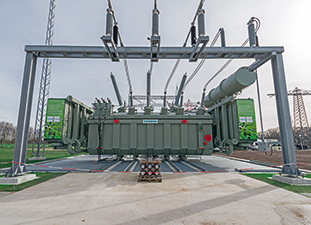Siemens delivers world's first vegetable oil transformer in the 420 kV capacity range

Activation of the world's first power transformer by Siemens, insulated and cooled using vegetable oil in the Bruchsal substation.
The world's first power transformer insulated and cooled using vegetable oil links the 380 kV extra-high voltage level with the 110 kV grid of the subordinate distribution grid operator in the Bruchsal substation.
This ensures that the power transported via the extra-high voltage lines to Bruchsal is fed into the 110 kV grids of the distribution system operator and that this power arrives safely and reliably at households and industry throughout the region.
The special feature of this transformer is the material that it is filled with. For this marks the first time that vegetable oil is used with this voltage category instead of mineral oil for insulation and cooling. This vegetable oil is not only more environmentally friendly, but is also much less flammable than mineral oil.
“The use of this groundwater-neutral and bio-degradable insulating oil, with its high level of environmental compatibility was the decisive factor for us choosing this transformer”, stresses Michael Schäfer, head of systems technology at TransnetBW. The insulating oil for this new transformer is produced solely from renewable, plant resources and is completely bio-degradable.
This is but one of Siemens' decisive contributions to environmental sustainability. The new power transformer for the Bruchsal-Kändelweg substation is the world's first transformer at the 420 kV extra-high voltage level for which no water hazard classification must be issued. As a result, this transformer can be installed and operated in water conservation areas or in zones subject to stringent environmental protection restrictions.
“The properties of this vegetable oil are not only beneficial to the environment, but also offer the customer cost advantages over transformers cooled with conventional mineral oil”, explained Beatrix Natter, CEO of the Transformers business unit at Siemens Energy. “The bio-degradability of the insulating oil means that additional collecting vessels and separation systems are no longer required at the installation location, resulting in cost savings for these items.”
Other important aspects are the substantially higher flashpoint and combustion point of the vegetable oil as compared to that of the mineral oil used up to now. The lower flammability of this insulating oil also provides the transformer with a higher fire protection classification. This means that the fire protection system can be optimized accordingly and that the transformer can also be operated favorably in densely populated residential areas.
Vegetable-oil-based transformers and the associated service are part of Siemens' Environmental Portfolio. Around 43 percent of its total revenue stems from green products and solutions. That makes Siemens one of the world's leading providers of eco-friendly technology.
Contact
Media Contact
More Information:
http://www.siemens.comAll latest news from the category: Power and Electrical Engineering
This topic covers issues related to energy generation, conversion, transportation and consumption and how the industry is addressing the challenge of energy efficiency in general.
innovations-report provides in-depth and informative reports and articles on subjects ranging from wind energy, fuel cell technology, solar energy, geothermal energy, petroleum, gas, nuclear engineering, alternative energy and energy efficiency to fusion, hydrogen and superconductor technologies.
Newest articles

First-of-its-kind study uses remote sensing to monitor plastic debris in rivers and lakes
Remote sensing creates a cost-effective solution to monitoring plastic pollution. A first-of-its-kind study from researchers at the University of Minnesota Twin Cities shows how remote sensing can help monitor and…

Laser-based artificial neuron mimics nerve cell functions at lightning speed
With a processing speed a billion times faster than nature, chip-based laser neuron could help advance AI tasks such as pattern recognition and sequence prediction. Researchers have developed a laser-based…

Optimising the processing of plastic waste
Just one look in the yellow bin reveals a colourful jumble of different types of plastic. However, the purer and more uniform plastic waste is, the easier it is to…



